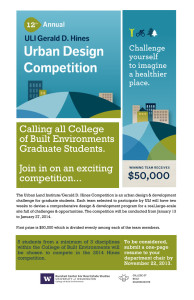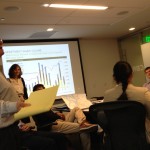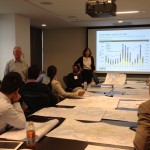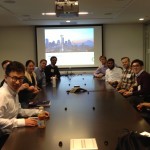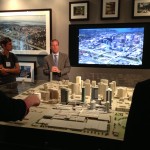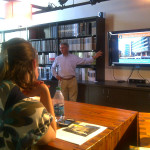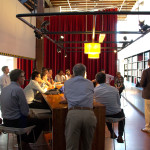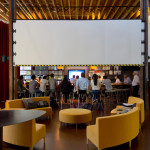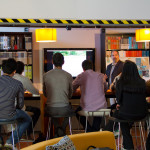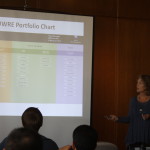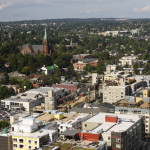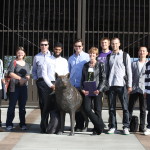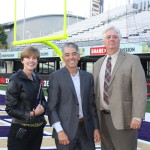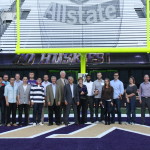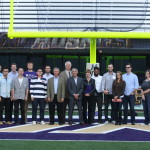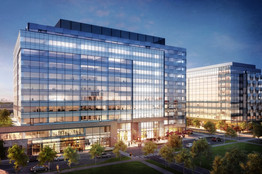MSRE class of 2011 alumni Brian Kalthoff and Boting Zhang have created a website, Socially Responsible Development: A Community Dialogue, to address the largely polarized debate surrounding development in Seattle. Their hope is to carve out a space for curious minds to engage in a meaningful, research-based conversation about what socially responsible development looks like.
Since August 2013, Brian and Boting have met with a number of neighborhood level developers (for and non-profit alike) and community stakeholders to help them develop a questionnaire for the mayoral candidates in regards to their views of socially responsible development. They have submitted the same questionnaire to candidates running for positions on Seattle’s City Council. Their website now has the Council candidate Q&A available for viewing. Check out their blog post below, and if you’re a Seattle resident, please don’t forget to vote in the November 5 general election.
—
Guest bloggers: Brian Kalthoff and Bo Zhang
Over the summer, we began working with a small, diverse group of both for-profit and non-profit housing developers and citizens, all with an interest in promoting socially responsible development toward Seattle’s future built form. The Harrell, McGinn, Murray, and Steinbrueck campaigns all responded with detailed responses to our questionnaire.
After the primary election, we submitted the same questions to the candidates for City Council. We are happy to say that we have received responses from all but one campaign. The Conlin, Sawant, Bagshaw, Bellomio, Licata, O’Brien, and Shen campaigns all responded to our questions.
As the responses cannot be succinctly summarized—and with 7 different responses to 5 essay questions—below is not so much a summary as an excerpt from each full response:
Richard Conlin views the most “salient” issue regarding socially responsible development (SRD) to be the work of integrating affordable housing and transportation choices in a way that is accessible to all. His challenger, Kshama Sawant, acknowledges that Seattle has reason to tout its green credentials, but writes that these improvements are often at the expense of already marginalized communities. Sally Bagshaw hopes to advance SRD by requiring affordable units in market rate apartments, while Sam Bellomio advocates strengthening citizen engagement. Mike O’Brien, in his response, highlights his success in securing funds for a cultural center in Little Saigon as part of the Yesler Terrace Re-Development, as a way to prevent displacement and retain the neighborhood character.
Potential negative outcomes of growth, for Albert Shen, include inadequate public transit relative to the city’s growth, in particular to underserved communities—for example, the lack of a Graham Street LINK station. Kshama Sawant sees gentrification as a negative outcome of growth and development, and proposes freezing rents and enacting rent control as remedies. While Richard Conlin, after explaining the nature of Seattle’s boom-bust cycles, asserts that people in Seattle do not fear change, but rather loss. According to Sally Bagshaw, this is caused by rapid growth—and to Nick Licata this rapid growth tends to exacerbate already existing discrepancies in wealth.
Nick Licata asserts that the “Seattle process” can make the city reactive, when it should be responsive—essentially always “one (economic) boom behind.” However, the he goes on to say that as a model of community engagement, Seattle has set an international example. Mike O’Brien sees the “Seattle process” as an opportunity to fully examine a development’s merits, but that the lengthy review can increase costs that ultimately get passed on higher housing costs. Both Albert Shen and Kshama Sawant indicated that the process can cause delays to the supply of affordable housing, and both draw the connection between the delay in affordable housing and an inadequate public transportation system. Kshama Sawant proposes that while the “Seattle process” has somewhat democratized the process, monied influence still holds undue sway. Richard Conlin values the democratic principles behind the process, but sees it fall apart at times when it is an endless loop, and in the worst case the views ultimately taken into account are simply the last ones standing. He laments that the current land use code is often too focused on things we do not want to see happen, rather than promote opportunities for the things we would like to see happen.
In regards to building typologies and parking, Sally Bagshaw recognizes people’s desire to preserve single family neighborhoods, but states that 100,000 new neighbors are expected within city limits within the next 10 years. She has been impressed by some of the density solutions advocated by Seattle-based Sightline Institute’s Founder and Executive Director, Alan Durning, in his book Finding Home. These include, for example, easing parking and owner occupancy restrictions for (modest) detached and attached accessory dwelling units. Sam Bellomio states that the future typologies will be decided by the impacted neighborhoods. Nearly all candidates expressed the very critical need for improved public transportation to accompany any new growth in the city or any change to the building typologies as issues of both efficiency, sustainability, and equity.
All the candidates who responded express a desire for a range of affordability across all neighborhoods. Mike O’Brien sees the need for a multi-faceted approach that includes strengthening the incentive program in the SLU rezone to a variety of housing types, including micro-housing. Albert Shen states that his 8 years with the Seattle Chinatown International District Preservation and Development Authority (SCIDpda), a non-profit housing provider and community development agency, gives him direct experience in working with the affordable housing community. Kshama Sawant sees raising wages, controlling rents, and taking advantage of currently vacant and underutilized buildings as steps to take before increasing supply. Richard Conlin sees the greatest need for people who earn 30-50% of area median income (AMI), especially as the Federal government reduces its commitment, and sees the Housing Levy as a key tool for this. Nick Licata states that preservation of existing housing is a key to affordability as well, and that the creation of the City’s rental housing inspection program, which he spearheaded, will promote stronger maintenance practices and will help prevent some properties from reaching such a state of disrepair that they are vulnerable to redevelopment.
